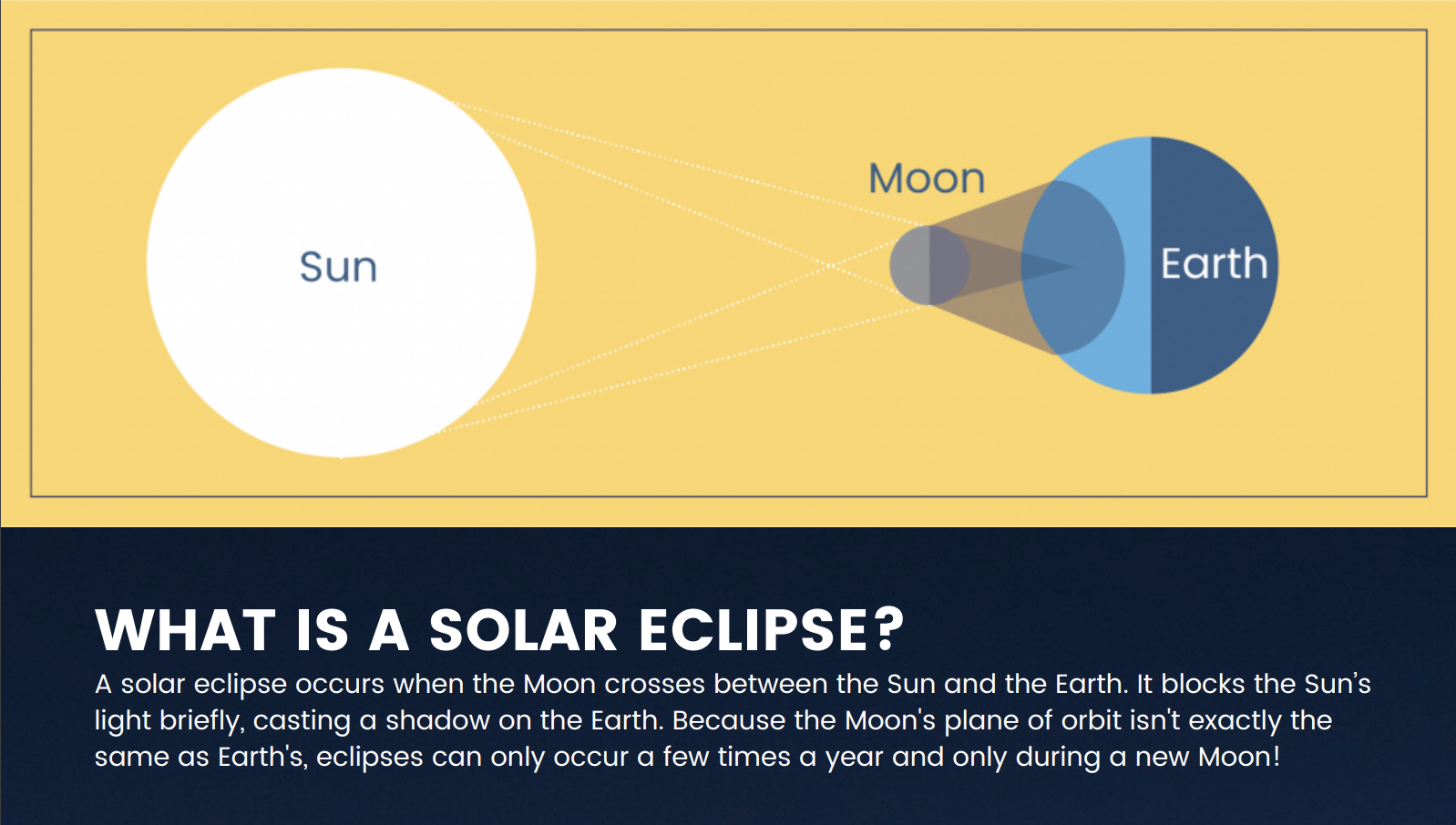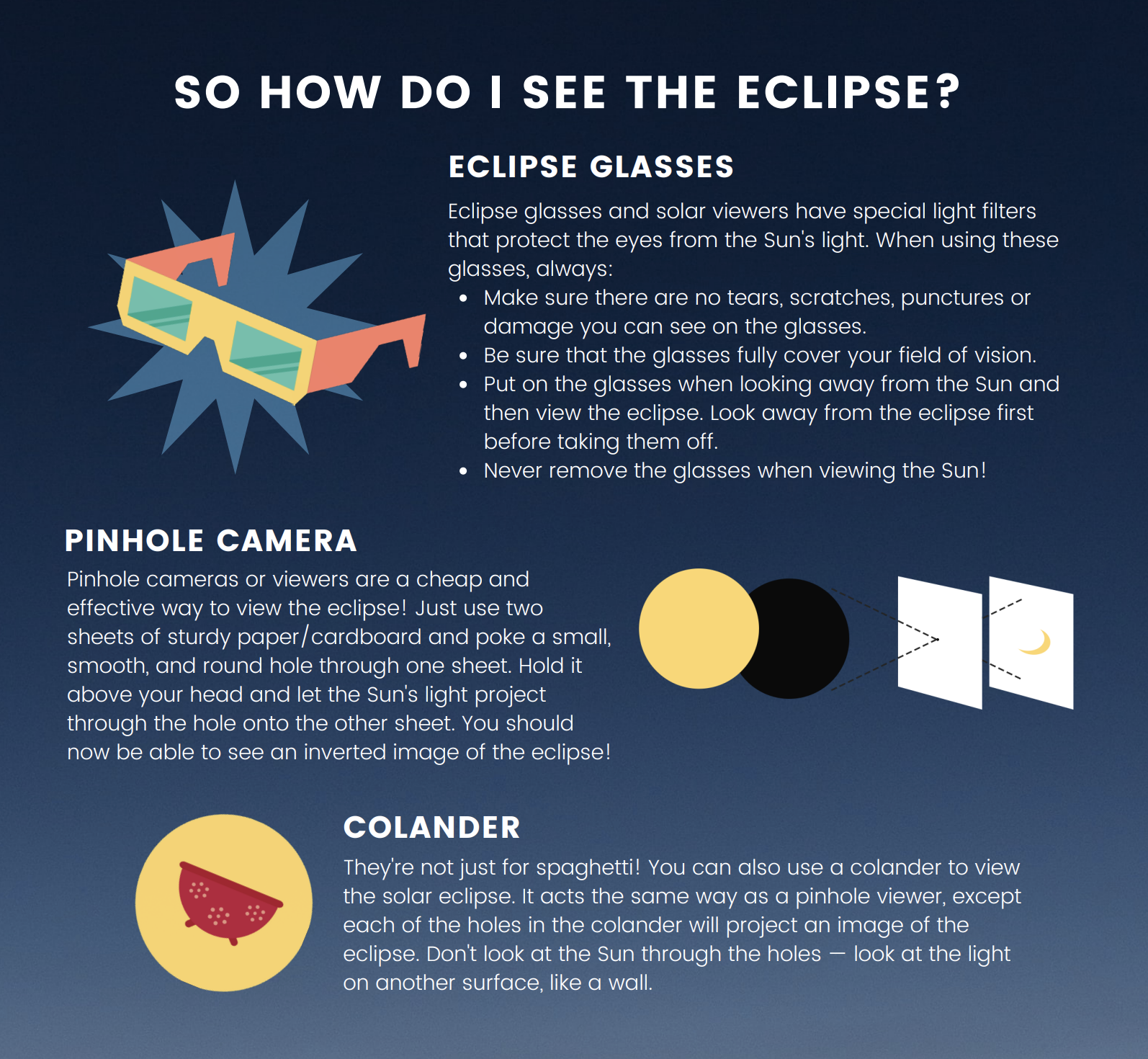Solar Eclipses
Learn more about why solar eclipses happen, how to observe them, when the next eclipse is and what to expect!
Annular Solar Eclipse - October 14, 2023
A large portion of the United States will be treated to an Annular Solar Eclipse on October 14th! All populated areas in Canada will see a partial eclipse on this day.
For more information about this particular eclipse, please visit timeanddate.com.
Total Solar Eclipse - April 8, 2024
This eclipse should be the biggest news in astronomy next year! With a path of totality that crosses through three countries, thirteen states and five provinces, this eclipse will be one for the books!
To find out more about what RASC Centres and other members of our community are doing for this eclipse, and for resources specific to this eclipse, check out rasc.ca/eclipse2024.
FAQs About Eclipses
Looking for answers about solar viewing? Check out our series of videos from the June 2021 Annular Solar Eclipse.
Why is looking at an eclipse so bad?
#solareclipse2021 pic.twitter.com/upi7lU9HdE
— RASC National (@rasc) May 19, 2021
How come we only get eclipses sometimes?
Watch as our Outreach Coordinator Jenna Hinds demonstrates the Moon & Sun alignment which allows us to have an annular solar eclipse on June 10! Tune in for more videos every other day. #solareclipse pic.twitter.com/b7pdI5r5CO
— RASC National (@rasc) May 23, 2021
Why do solar and lunar eclipses come in pairs? (Please note, the details in this video are from a former eclipse)
Did you know that solar eclipses are usually accompanied by lunar eclipses which are weeks apart? In fact, a lunar eclipse is taking place tomorrow around 5:40 am EDT! pic.twitter.com/oTqOBpSNWh
— RASC National (@rasc) May 25, 2021
How can I take a photo of a solar eclipse?
This video, by our Outreach Coordinator Jenna Hinds, explains how it could be possible for you to take phone solar eclipse images! To learn more about the June 10 annular solar eclipse, keep watching our videos! pic.twitter.com/wC7l7XtaJ0
— RASC National (@rasc) May 31, 2021
Why are eclipses on Earth so special?
Do you ever wonder how both the Moon and the Sun appear the same size to us even though the Sun is much bigger? This video explains this concept and how it plays into the eclipses we see on Earth! #eclipse pic.twitter.com/T5gtjwjLAi
— RASC National (@rasc) May 25, 2021
What are the different types of eclipses? (Please note, the details in this video are from a former eclipse)
Do you frequently hear the words "annular" "total" or "partial" when eclipses are brought up and wonder what they mean? There are multiple ways by which an eclipse forms thus the different types! #Eclipse2021 pic.twitter.com/XtJJtd6PBF
— RASC National (@rasc) May 27, 2021
What are some solar eclipse DON'Ts?
You heard it here first "Don't look directly at the eclipse." But there are a few other things to keep in mind for your own safety! Jenna Hinds will be your guide this year for the June 10th solar eclipse! pic.twitter.com/ckSzakUY7K
— RASC National (@rasc) May 21, 2021
How come only some parts of Earth get to see a solar eclipse? (Please note, the details in this video are from a former eclipse)
Do you want to know if you will be able to see the June 10th solar eclipse? There's good news and bad news depending on where you live! Hint: the good news is for the people up north! pic.twitter.com/4B2WIyQtGm
— RASC National (@rasc) June 2, 2021
Educator Resources
Discover the Universe
Discover the Universe trains educators interested in bringing space to their audiences. For the 2024 Eclipse, they have put together some resources on eclipse viewing and observing and are providing training on the use of solar eclipse glasses to teachers!
Eye Safety
Looking for scientific resources about protecting your eyes? Check out RASC member and volunteer Dr. B. Ralph Chou's paper, originally written for the 2012 Transit of Venus, regarding how to protect your eyes during an eclipse - and what not to do. You can watch Dr. Chou's talk on eye safety here.



